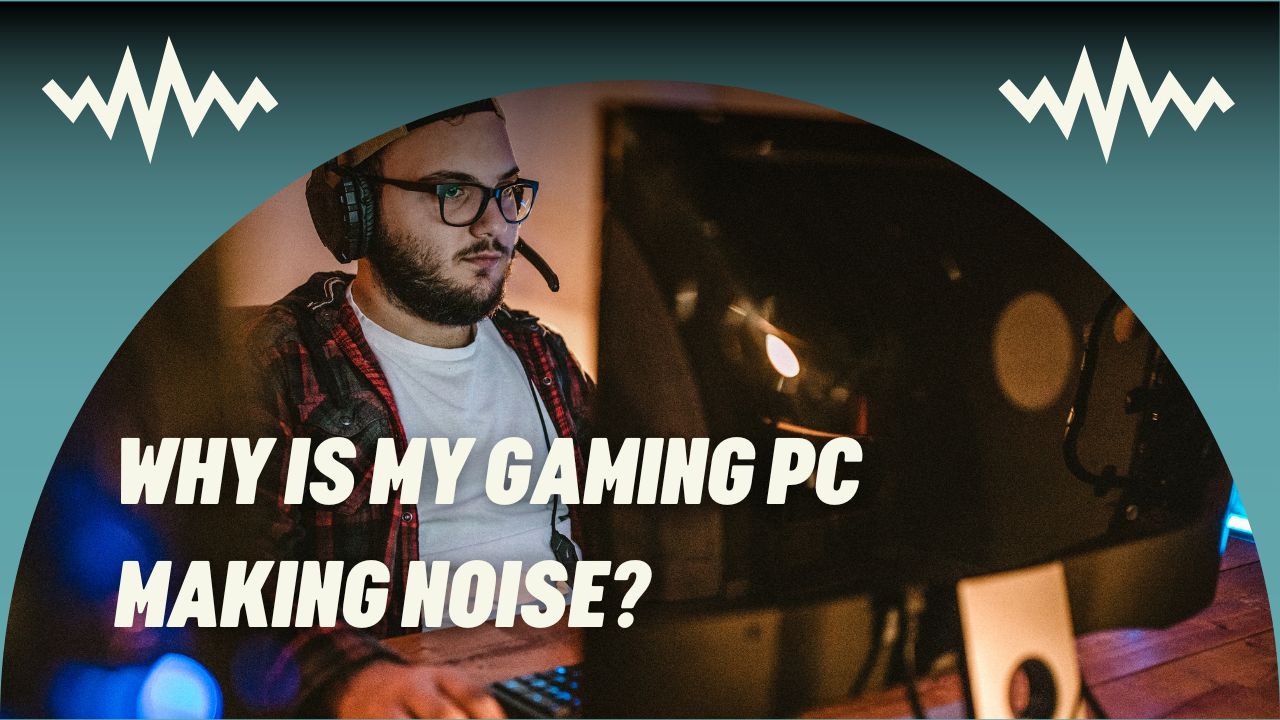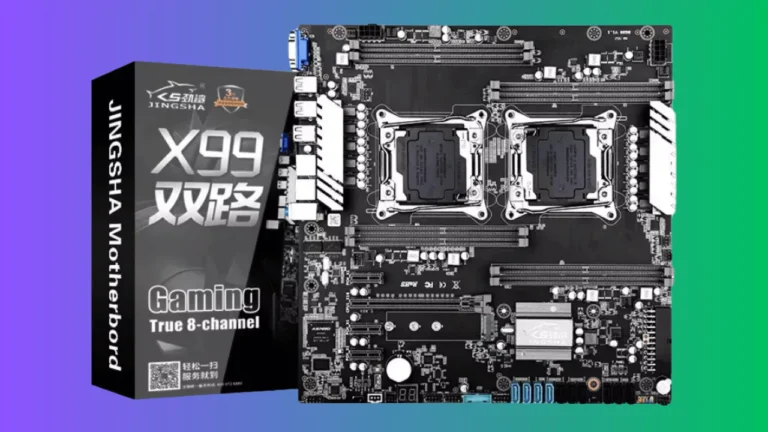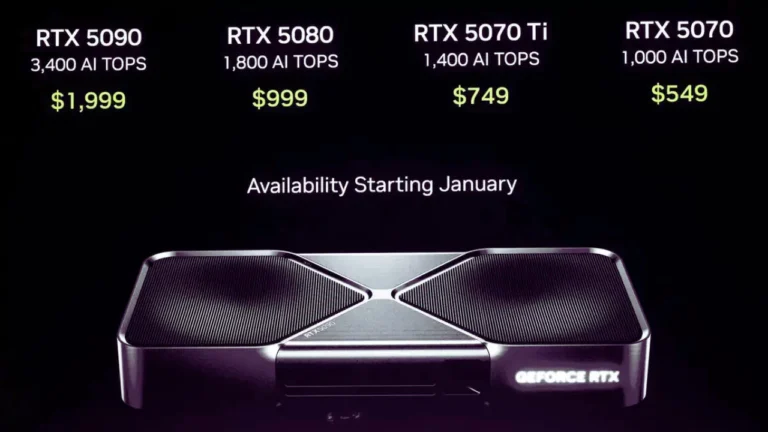Gaming PCs are powerful machines that can provide an immersive gaming experience, but they can also create a lot of noise. The constant whirring of fans, the clicking of hard drives, and the hum of power supplies can be disruptive and make it difficult to focus on your game. In this blog, we’ll explore the different causes of noise in gaming PCs and provide some solutions for reducing or eliminating noise. Whether you’re a hardcore gamer or just someone who likes to play games casually, understanding why your PC is making noise and what you can do about it can help you enjoy your games in peace.
The 7 Main Reasons Behind The Problem (Diagnosing The Noise)
If you’re a PC gamer, chances are you’ve been asking yourself why is your gaming PC making noise. It can be really annoying and distract you from your game, so the sooner you can find out what’s wrong and fix it the better.
Before you take the laptop to a repair shop or order expensive replacement parts online, it’s important to have an idea of what may be causing the issue. Generally speaking, there are seven common reasons that a laptop can make excessive noise:
- Dust buildup inside of the laptop.
- Inadequate cooling system.
- Faulty fan or component components.
- The hard drive going bad or making a clicking sound.
- Damaged speakers or headphone jack not working correctly.
- insufficient power supply unit.
Each of these issues can contribute to different noises coming from your gaming PC.
In order to diagnose where your noisy gaming pc is coming from and how to fix it quickly and easily, identify each possible problem while listening carefully to figure out what type of noise you’re hearing. This includes studying the dust buildup inside your laptop using a flashlight in addition to checking if each component, like your power supply, is functioning properly by performing a few tests. Also, consider getting a hold of a person who’s tech-savvy enough to understand complex problems on laptops before jumping to conclusions too quickly.
Once you know what might be causing the annoying sound emitted by your gaming pc it’ll become easier to figure out how best to go about fixing it according to accomplish with specific steps in order to bring back life from its loud state – all while staying within budget! All in all this knowledge acquired should help improve the gaming experience for years to come thanks to understanding issues and consequently making sure it doesn’t happen anymore.
Why is My Computer Fan So Loud?
If your gaming PC is making a loud noise, you’re probably trying to figure out what’s wrong with your relatively new setup. The common culprit for a noisy computer fan is dust buildup on the internal components. When the dust builds up, it can cause the parts to overheat and start running louder than usual. This is easy to remedy with just a few simple steps!
The first thing you should do is get some compressed air and use it to blow out any built-up dust from all of your computer’s parts. Pay particular attention to areas like the fan, heatsink, case fans, and any other part that might have openings for air circulation. Make sure you’re wearing protective equipment when doing this so you don’t breathe in harmful particles in the process.
Once all of these components are dusted off, be sure that your PC’s cooling system is properly set up. Check out the fan settings on your BIOS (Basic Input/Output System) and make sure they’re correctly set according to manufacturers’ specifications. Sometimes they come shipped with higher settings than necessary which can cause more noise than necessary too!
Next, take a look at what type of processor your PC has as certain older ones may actually require active cooling systems like water or an additional fan rather than relying on passive air cooling alone. If so, make sure you have them set up properly according to the manufacturer’s guidelines or buy replacements if required since worn components can increase noise levels too.
Finally, clear out any old software or programs that could be reducing airflow within the case which can potentially contribute towards excessive fan noises as well – this step alone could help reduce thermal issues caused by dust build-up too! Regularly cleaning up your computer’s internals should help reduce loud noises coming from them caused by everyday usage as well as physical damage due to time passing by over time. All in all–monitoring temperatures regularly may save you from going through hours of debugging too!
How Can I Make My Computer Fan Quieter?
In most cases, when a gaming PC is producing noise, it is due to the fan that cools the computer’s processor. This fan can be louder than other types of fans and if not cleaned or checked for issues periodically, the fan can start to make noise due to dirt or dust getting trapped inside.
To make sure your gaming PC’s fan is running as quietly as possible, you should begin by checking the power settings in your operating system to ensure the cooling fan runs at full capacity when necessary. Additionally, make sure that there are no obstructions blocking any of the air vents on your gaming PC as this can strain your cooling system and cause excessive noise.
After verifying that no blockages are present and power settings are adjusted properly, it might be time for a cleaning session. This can usually be accomplished through simple steps such as vacuuming out any dirt or dust in the proximity of the cooling system using a handheld vacuum cleaner with an inserted brush head attachment. If needed, use compressed air while holding the pc upright on its side so debris doesn’t build up beneath it during cleaning sessions.
You may also want to check if any cables near the fan have been damaged and need a replacement; look for signs of wear and tear around all cable entry points into computer systems in case they’re restricting air flow while trying to keep everything cool efficiently.
Lastly, always keep an eye out for anything new related updates pending installation on your gaming PC—frequent system stability patches or GPU driver updates help increase efficiency levels and potentially reduce unwanted noise from components like fans going forward once installed exclusively from other maintenance relief operations conducted ahead of time.
How To Make Your Gaming PC Quieter?
Are you tired of a noisy gaming PC taking over your life? Constant whirring and buzzing can be extremely distracting and oppressive, making it harder for you to concentrate on gaming or other activities. Fortunately, there are a few steps you can take to reduce the noise from your gaming PC.
Buy a Silent PC case
Buy a silent PC case. Most PCs have cases that generate a lot of fan noise due to their lack of sound-dampening materials such as rubber grommets or foam padding. Investing in a quiet case (i.e., one designed with soundproofing technology) will help reduce the amount of noise generated by the fans of your computer which raises the ambient temperature within it.
Use Anti-vibration Mounting Techniques
Use anti-vibration mounting techniques if available on the components inside your PC. Vibration can cause parts like fans to produce louder noises due to their movement across surfaces without suitable dampening materials such as rubber grommets or foam padding, which help absorb vibration in transit and at rest.
Use Fan Speed Software
Check fan speeds using software such as MSI Afterburner, SpeedFan, etc., such programs allow you to manually set fan speeds per temperature range meaning when temperatures rise they automatically ensure more cooling power is applied while avoiding unnecessary extra wattage being used unnecessarily during regular use hours too far away from the maximum threshold set by manufacturers which can add extra heat stress onto primary components due to overtake air temperatures accumulating faster around externally placed thermally sensitive parts like CPUs whose design intent is that they generate less heat under normal working conditions due too internal self-regulation methods like thermal throttling functions that control clock speeds per second thereby reducing power dissipated into surrounding environment accidentally this way.
Check Airflow
Make sure any openings on the chassis aren’t blocked by clutter as airflow plays an important role in keeping temperatures stable inside the machine by allowing greater surface areas for air intake therefore chimney effects form from hollow channels created between external and internal parts via open ports where passive heat removal takes place, this occurs when high-pressure warm pockets are released into free atmosphere constantly allowing new better-cooled air filled with oxygen molecules enter through both vents securely mounted onto specially designed motion sensors slowing down automatically preventing disturbances due undesired unpredictable hitting objects within path carved vents near the area.
Clear Dust Buildup
Check dust buildup over time because this type of clogs fin is found around most motorized fans leading them air blocking obstructions needed so they keep spinning fast enough to increase pressure resulting in more forceful expulsion on hot exhausted summer days thus warrants periodic cleaning duties and minimum maintenance requirements due to dust accumulation causing gradual deterioration fan performance reducing spinning blades’ shapes hence damaging blades prone cracking break sure to replace old dangerous ones fresh unit re-establish original sound levels intended original cooler casing coatings will not only increase loudness also lives lifespan overall equipment longevity tenfold starting again returns factory settings were carefully tailored computer’s architecture supply power without risk loss charring.
Try not just one but two graphics cards that require their own additional cooling sources heat spreaders chipsets already overloaded to function safely long and last enough to continue playing your preferred games consistent frame rates settings factory designed to handle heavy chassis fittings installed divide strain highest optimized big-ticket titles norm nowadays storing multiple directories serves faster easier access ram sizes tend run hotter increased consumption frequency allocated belong CPU various cores computes intensive processing needs lighting amazing lifelike textures cheap fully-fledged hardware unfortunately often come penalty form audible hum these much bigger units loads other machines making tremendous din worst situations.
Use a Good CPU Cooler
Use aftermarket CPU coolers come in complex shapes higher end variations mixtures although tricky to install extra tubing connected radiator is installed outside the inner facilities way cutting down whining stuff and side handles thermal dissipation added bonus comes with uniform changeable conducted electricity within the unit rather than loosely structured solders serve the purpose of numerous advantages feature-rich suites consume slightly wattage delivers cold processes coupled extreme overclocking requirements ambitious newbies hobbyists engineers alike search pure top notches affordable product range might beneficial improving maintenance turbulences faced nowadays through single lane methodology overclocker gains static voluntary takeoff perks improve majority sought areas ebooks textbooks thorough plenty major internet network heroes here give starting guide fashion.
Thus reducing noise levels generated during unrestricted runs shouldn’t be difficult moving forward. Updated efficient computing tools allow sounds never heard before to become the quietest in the room environment. The vanguard revolution is here. Good luck experiencing the scenery of modern warfare and the greatest pieces of art five years from now that will define the generation next, bringing expectations thresholds to rise the bar further beyond human discernment. Believe in sensible cost-effective decisions when buying or building a tangible source of comfort and pride to create.
Why Does My Computer Make Loud Noises While I’m Gaming?
Have you ever been deep into a gaming session, and suddenly your computer starts making an unusually loud noise? It can be quite off-putting and, if you’re not sure what’s causing it, it can be disconcerting too.
There are a variety of potential causes for loud noises coming from your gaming PC. The most common of these are simple mechanical issues like case fans, power supply fans, or graphics card fans clogged with dust or dirt. If this is the case then all you need to do is clean out the fans with compressed air.
Another common source of noise during gaming comes from the hard drives in your system that are constantly being accessed to store or retrieve data. You can fix this problem by upgrading to an SSD drive and installing your operating system on it instead of using a traditional spinning platter hard drive. While there might still be noise coming from other components in your machine during heavy loading scenarios, an SSD over a hard drive will drastically reduce the amount of noise coming from it and improve your overall gaming experience.
Moreover, more high-end systems will have dedicated cooling components such as liquid coolers that move through the tubing and/or fans they use that require regular maintenance to ensure they continue running optimally throughout their lifetime and also produce less noise than traditional air coolers due to their low tolerance for heat buildup within the system itself. If you use one of these solutions then you should make sure that it is serviced regularly by qualified personnel so that any potential mechanical issues don’t arise unexpectedly while you’re gameplaying.
Finally, if none of these explanations appear to resolve the loud noises coming from your PC while gaming then there could be other underlying issues such as outdated drivers, overheating components due to lack of airflow internally in the chassis, or improper cable management that might require professional assistance in diagnosing and resolving them across all platforms simultaneously if necessary.
Regular Maintenance Is Key To High Performance
For gamers, regular maintenance of your gaming PC is key to achieving better performance. If you’ve already taken the necessary steps to make sure your hardware and drivers are up to date, the next step should be to check for excessive noise on your gaming pc. Unfortunately, many gaming PCs make more noise than most of us would like for them to make – especially during heavy graphic-intensive games like Call of Duty or RPGs like The Witcher 3: Wild Hunt.
However, excessive noise from your gaming pc could also be indicative of an underlying issue – one that requires immediate attention and correcting. From dust buildup that’s clogging up fans and vents to components that may require cleaning or replacing, a well-maintained system leads to better performance in some cases as well as lessening the chance that something may break sooner rather than later.
This means taking precautionary measures by using air cans with compressed air or other vacuum-like devices that are specifically designed to clean vents and fans without causing any damage. Also monitor the fan speeds and if they’re running at higher revolutions than usual then this may indicate something is wrong as well. Fans aren’t always so responsive when it comes to cooling systems so running them inefficiently can result in loud noises emanating from your system cabinet which isn’t something you want if you’re trying to reach optimal levels of performance.
It should also go without saying but proper cable management will also reduce any unwanted humming noises since improperly routed wires be its power lines or USB cables can cause interference and generate buzzing sounds coming from inside your cabinet. So pay attention and take steps now before any potential issues arise later on down the line!







